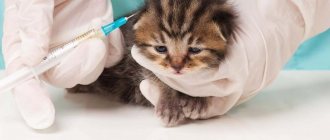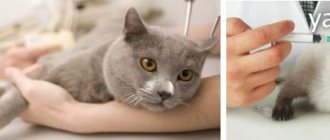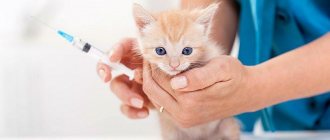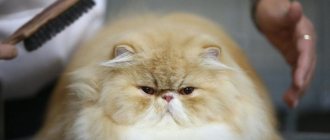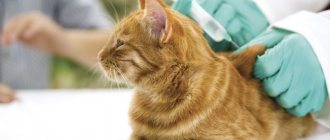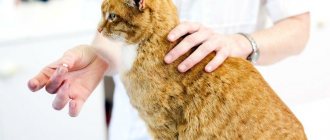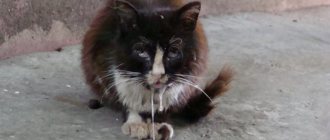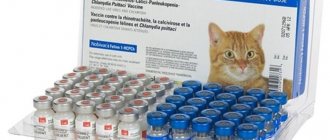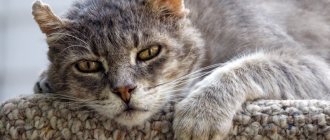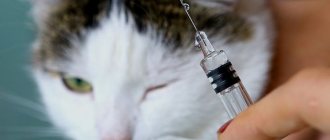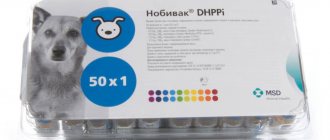Complex vaccination for cats at Alisavet is:
- hypoallergenic imported complex vaccination for cats
- Same day procedure
- injection and paperwork in 10 minutes
Select a vaccine and register your cat for vaccination
Click on the button below and fill out an application if:
- the pet has not been vaccinated previously;
- you don’t know what vaccine you need;
- or a different brand of vaccine was used.
We will call you back and offer options for solving the problem, and also calculate the final cost of vaccination in advance.
I want to vaccinate my cat, but I don’t know how or with what
What is the vaccination process?
It is important for every owner to know that a powerful immune system protects your pet from illness. In the first weeks of life, the kitten’s body is protected by maternal antibodies, which it receives from milk. As you grow and switch to new diets, your immune system weakens. During this period, planned vaccination activities allow maintaining immunity.
A vaccine is an artificially created preparation containing weakened or non-viable forms of certain pathogens of infectious diseases. Its introduction causes a response, manifested by the creation of antibodies - immune protection against microorganisms that persists for a certain time.
Vaccination of a pet is a mandatory event. Lack of contact with street animals and constant presence in a limited area of the apartment does not guarantee that your pet will not get sick. After all, you yourself can become a source of infection - pathogenic microorganisms penetrate the room:
- when ventilating;
- with water and food;
- on your clothes, shoes;
- on all things entering the house from the outside.
The vaccine is not a medicine, but its use helps prevent possible infectious diseases. If the disease has already begun, vaccination will be useless.
Compared to the required course of treatment:
- vaccination is much cheaper;
- its implementation is much easier to tolerate even for a small kitten;
- effectiveness exceeds any methods of limiting contact or preventing infection of the animal.
As a preventative measure, vaccination is the most reliable and easily implemented way to keep your cat healthy.
What are we vaccinating against?
The vaccine for cats is administered to prevent:
- rabies
- calicivirus
- viral rhinotracheitis
- panleukopenia
- chlamydia (not found in all vaccines)
- viral leukemia (separate vaccine)
How is vaccination carried out?
According to modern international standards, vaccines can be divided into basic, additional and not recommended.
Basic vaccination provides protection against panleukopenia, infectious rhinotracheitis, calicivirus and rabies. It is recommended to start this type of vaccination at 8–9 weeks of age. It is usually given twice at an interval of 3-4 weeks, but international protocols recommend repeating the vaccine every 3-4 weeks until 16-20 weeks of age. The last injection of the drug is given at the age of 6–12 months. Next, the animal is vaccinated once a year throughout its life.
Additional vaccines are aimed at creating immunity against leukemia, immunodeficiency, bordetellosis and chlamydial infection. Their use depends on the content of the animal, requires additional research and is strictly agreed with the doctor.
Vaccines against feline infectious peritonitis and dermatophytosis are not recommended for use due to the insufficient evidence base of their effectiveness.
There is no need to fear for the well-being of your small pet - specialists use only the appropriate vaccine and vaccinate a previously prepared animal.
- Before starting vaccination activities, 7-10 days before vaccination, it is necessary to carry out deworming - give an anthelmintic drug that will help cleanse the body of internal parasites (worms). An untreated pet can be vaccinated, but it is not advisable. Without treatment, reduced immune development is more often observed.
- On the day of the procedure, the cat is examined by a veterinarian to assess its general condition and be cleared for vaccination.
- The drug is administered according to the instructions. In most cases - subcutaneously, if possible, in the popliteal fold. At the site of vaccine administration, a compacted area with a slightly elevated temperature often forms, which will disappear on its own after 3-4 weeks. This is a normal reaction of the body to the penetration of a pathogen, and it should not frighten the pet owner.
Preparing your cat for vaccination in 2 steps:
- 2-3 weeks before vaccination, give your pet an anti-worm medication (if the deworming regimen is not followed).
- On the day of vaccination, take your veterinary passport with you, if you have one.
Why deworm?
Cats perform daily hygiene procedures by licking their body and paws, so they always have a high risk of ingesting helminth eggs. Tiny parasites are literally scattered in small beads on the asphalt, in the entrances and corridors of apartments.
It is impossible to find out about the presence of worms in the body without special laboratory tests. But since the risk of infection is high, it is assumed by default that helminths are still present. This means that the cat is sick. However, only healthy pets are vaccinated. If you leave dangerous inhabitants in the body of your four-legged friend, then due to low immunity the animal may have difficulty withstanding the vaccination or even become ill.
If every 3 months you do NOT give your pet a dewormer, then be sure to give your cat a dewormer 10-14 days before vaccination ! If the deworming schedule is followed, then there is no need to do it unscheduled.
It is better to give your cat a modern and safe drug in time than to spend a lot of time and money on treating your pet. Alisavet veterinary pharmacies have a large selection of anthelmintic drugs for cats.
The best vaccines for cats
The best vaccines for cats: Nobivak, Quadrikat and Purevax
Traditionally, veterinarians and large nursery breeders prefer to use multicomponent vaccines that create immunity to several diseases at once. Imported products with the trade names Nobivak, Quadrikat and Purevax enjoy a good reputation. They are designed to immunize both adults and young animals from 3 months and create effective protection against common diseases.
Nobivac for cats
Kittens are usually weaned from their mother no earlier than two months, and during this time the babies receive antibodies to many diseases through their mother's milk. That is why it is not necessary to vaccinate a kitten before eight weeks, since the antibodies will successfully destroy all components of the vaccine. Vaccination is a kind of introduction of a weakened form of the disease into the animal’s body; this is the only way to create lasting immunity. If maternal antibodies are present in the baby’s blood, then prevention will be useless, and subsequently the kitten will be defenseless against infections.
The Nobivak vaccine for cats provides stable protection against rhinotracheitis, panleukopenia and calcivirosis in kittens only after repeated vaccination. That is, a single administration of the drug to a young animal must certainly be repeated after three weeks. On the tenth day after repetition, normal immunity is formed.
Nobivak Triket Trio is a dry mass, packaged in ampoules, which should be diluted with a solvent of the same brand, Diluent, or liquid Rabisin for cats older than four months. Veterinary services require that the animal be vaccinated against rabies annually, since only the vaccine protects carnivores from the deadly disease. Rabies can only be prevented; it is impossible to cure a cat from this disease, which is why it is recommended that Nobivak Rabies in combination with Nobivak Tricat Trio be administered to adult cats annually.
Quad for cats
The Quadrikat vaccine is created for a single immunization of kittens from three months and adult animals against panleukopenia, respiratory diseases and rabies. This drug is practically harmless, as it does not contain live strains. It is chosen to minimize the burden on the immune system, since a single administration at the age of four months and annually thereafter is considered more gentle.
Vaccine Multifel
Multifel for cats is low cost and creates stable immunity against panleukopenia, chlamydia, calcivirosis and rhinotracheitis. That is, after vaccination, the cat becomes resistant to several diseases.
Vacderm vaccine
A very good remedy not only for the prevention of skin diseases, but also for the treatment of various fungal infections. Recommended for free-range cats to protect against microsporia and trichophytosis. Adult animals tolerate vaccination well; kittens should use Vakderm only for therapeutic purposes.
This is how we vaccinate:
- The administrator meets you and your pet at the registration desk.
- We issue an electronic outpatient card.
- We conduct a general examination of the cat, measure its body temperature, and weigh it.
- If your pet is clinically healthy and you have no complaints about its general condition, then we inject an anti-allergy drug into the hip. Many breeds are very prone to allergic reactions, despite the "mild" modern vaccines.
- After a couple of minutes, we inject the imported vaccine into the withers area.
- We issue a veterinary passport (new or existing) in accordance with all requirements of the Russian Federation.
Rules for vaccination and revaccination
Vaccination is a very responsible event, before which your pet needs to be carefully prepared and its health status checked. It is important to check that on the day of vaccination the kitten is:
- active and cheerful;
- body temperature did not exceed 38-39°C;
- there was no discharge from the eyes, nose, as well as sneezing and coughing;
- the animal ate well.
Before vaccination, communication with other cats that show signs of illness is strictly prohibited. It is also important to remember that only pets over 2 months of age are eligible for vaccination.
10 days before the vaccine is administered, fleas and ticks on the animal’s fur and body should be treated. This can be done using special drops or collars.
They also carry out deworming, ridding the pet of possible infection with worms. It is better if this procedure is carried out twice with a break of 10 days.
It is not recommended to vaccinate within 3 weeks after surgery, if any. When treated with antibiotics, the medical tap is effective for 2 weeks. After this period, if all health indicators are present, the animal is vaccinated.
If the pet was picked up from the street, you need to undergo the necessary tests that will show the presence or absence of antibodies to certain types of diseases in the blood. It is strictly forbidden to re-vaccinate an animal.
The owner of a pet should obtain a veterinary passport, which will record the vaccination schedule, medications that were used and all health indicators of the pet.
To carry out vaccination, you need to choose an experienced doctor who will not allow violations during the procedure. Otherwise, complications or unwanted side effects may develop.
It is also better to entrust the choice of vaccine to a professional. However, you should adhere to the general rules for selecting medications:
- for a young kitten it is better to choose imported vaccines, since their effect on the body is milder;
- Vaccination is administered strictly in accordance with the instructions;
- You must first make sure that the expiration date of the substance is in accordance with the expiration date; it is unacceptable to use expired medicine.
For half an hour after administration, you need to sit within the walls of the veterinary clinic, observing the cat. At this time, an allergic reaction may develop. Therefore, it is better to be closer to the doctor at this moment.
How much does a comprehensive vaccination for a cat cost?
We give a 100% guarantee that for more than 10 years, the Alisavet network of veterinary clinics has been purchasing imported vaccines with all the necessary documents only from reliable and time-tested suppliers. All bottles are brought to us in special containers subject to temperature control.
We believe that any preventative treatment should be available to you. Therefore, we do not inflate the cost of high-quality vaccines, correctly executed documents, examination and the procedure itself.
Registration of a veterinary passport is not included in the cost of vaccination and is paid separately, since many pets already have this document
PRIORIX
Manufacturer: Belgium
Live combination attenuated measles, mumps and rubella vaccine
Indications
active immunization against measles, mumps and rubella starting at 12 months of age.
Contraindications
- primary and secondary immunodeficiency;
- acute diseases and exacerbations of chronic diseases;
- pregnancy;
- hypersensitivity to neomycin and chicken egg white.
Side effect
Maybe:
- hyperemia at the injection site (7.2%),
- rash(7.1%),
- increase in temperature (6.4%),
- pain and swelling at the injection site (3.1% and 2.6%, respectively),
- swelling of the parotid salivary glands (0.7%),
- febrile seizures (0.1%).
In some cases:
- Development of symptoms characteristic of an upper respiratory tract infection (rhinitis, cough, bronchitis).
Cost of vaccinations for kittens
In our clinic, for a relatively low cost, you can vaccinate your pet with high-quality vaccines against the most common infections. The clinic guarantees compliance with the rules for storing and transporting vaccines.
All animal owners need to remember that the health and quality of life of their charges depends only on them. Timely vaccination significantly increases the chances that your cat will not contract a dangerous disease.
Health to you and your pets!
Quarantine
After each vaccination, your pet must undergo a three-week quarantine. The fact is that strong immunity is formed in the cat during this time, and the vaccine will not yet be able to protect its body from infection. During this period, it is not recommended to bathe, overcool or exercise, or take your pet with you outside (for example, to the dacha). If there are other animals in the house that go outside, it is better to prevent the cat from coming into contact with them.
The initial single injection of the vaccine does not form lasting immunity, so for many diseases it is necessary to carry out revaccination - re-vaccination.
